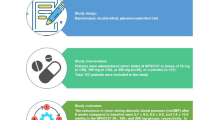Abstract
Both hypertension and depression are common disorders which may both involve components of the hypothalamic-pituitary-adrenal axis system and the Renin-Angiotensin-Aldosterone System (RAAS). These observations, coupled with growing evidence that RAAS-active drugs may have anti-depressant properties prompted us to study the frequency of anti-depressant medication usage in the patients receiving RAAS-active agents. A chart review was performed on 378 patients who were seen during a 3-month period in a primary care clinic and who were diagnosed with hypertension. Demographic information and data on the rates of co-administration of antihypertensive and anti-depressant medications was collected. Overall, 23.7% of the sample was on an antidepressant. 20% of the patients taking a RAAS-modifying medication were on an antidepressant, compared to 34% of those not taking a RAAS-modifying medication (Χ 2 = 8.88, P = 0.003). The patients taking a beta-blocker alone had the highest rate of antidepressant usage (40%). The use of RAAS-modifying medications was associated with an even lower rate of anti-depressant usage in males compared with females. It was also observed that the patients taking an additional diuretic had a significantly lower rate of antidepressant use (17.6%, Χ 2 = 5.81, P = 0.016) compared with the patients not taking a diuretic. The patients being treated with an ACE inhibitor or ARB showed significantly lower rates of antidepressant usage. The data is supportive of the hypothesis that these agents may possess anti-depressant effects.
Similar content being viewed by others
References
Axon RN, Zhao Y, Egede LE (2010) Association of depressive symptoms with all-cause and ischemic heart disease mortality in adults with self-reported hypertension. Am J Hypertens 23:30–37
Baghai TC, Schule C, Zill P, Deiml T, Eser D, Zwanzger P, Ella R, Rupprecht R, Bondy B (2004) The angiotensin I converting enzyme insertion/deletion polymorphism influences therapeutic outcome in major depressed women, but not in men. Neurosci Lett 363:38–42
Baghai TC, Binder EB, Schule C, Salyakina D, Eser D, Lucae S, Zwanzger P, Harberger C, Zill P, Ising M, Deimi T, Uhr M, Illig T, Wichmann H-E, Modell S, Nothdurfter C, Holsboer F, Muller-Myhsok B, Moller H-J, Rupprecht R, Bondy B (2006) Polymorphisms in the angiotensin-converting enzyme gene are associated with unipolar depression, ACE activity, and hypercortisolism. Mol Psychiatry 11:1003–1015
Bandelow B, Saleh K, Pauls J, Domschke K, Wedekind D, Falkai P (2007) Insertion/deletion polymorphism in the gene for angiotensin converting enzyme (ACE) in panic disorder: a gender-specific effect? World J Biol Psychiatry 10:1–5
Benicky J, Sanchez-Lemus E, Pavel J, Saavedra JM (2009) Anti-inflammatory effects of angiotensin receptor blockers in the brain and the periphery. Cell Mol Neurobiol 29:781–792
Carney RM, Freedland KE (2003) Depression, mortality, and medical morbidity in patients with coronary heart disease. Biol Psychiatry 54:241–247
Dinan TG (2009) Inflammatory markers in depression. Curr Opin Psychiatry 22:32–36
Fudalej S, Fudalej M, Kostrzewa G, Kuźniar P, Franaszczyk M, Wojnar M, Krajewski P, Ploski R (2009) Angiotensin-converting enzyme polymorphism and completed suicide: an association in Caucasians and evidence for a link with a method of self-injury. Neuropsychobiology 59:151–158
Gard PR, Mandy A, Sutcliffe MA (1999) Evidence of a possible role of altered angiotensin function in the treatment, but not etiology, of depression. Biol Psychiatry 34:1030–1034
Heck A, Lieb R, Ellgas A, Pfister H, Lucae S, Erhardt A, Himmerich H, Horstmann S, Koiber S, Ripke S, Műller-Myhsok B, Bettecken T, Uhr M, Holsboer F, Ising M (2009) Polymorphisms in the angiotensin-converting enzyme gene region predict coping styles in healthy adults and depressed patients. Am J Med Genet B Neuropsychiatr Genet 150B(1):110–114
Kubzansky LD, Adler GK (2010) Aldosterone: a forgotten mediator of the relationship between psychological stress and heart disease. Neurosci Biobehav Rev 34:80–86
McKay MS, Zakzanis KK (2010) The impact of treatment on HPA axis activity in unipolar major depression. J Psychiatr Res 44:183–192
Mesure G, Fallet A, Chevalier JF (1995) Psychotropic effects of angiotensin-converting enzyme inhibitors: what are the arguments? Encephale 21:609–614
Nayak V, Patil PA (2008) Antidepressant activity of fosinopril, ramipril and losartan, but not of lisinopril in depressive paradigms of albino rats and mice. Indian J Exp Biol 46:180–184
Okuyama S, Sakagawa T, Sugiyama F, Fukamizu A, Murakami K (1999) Reduction of depressive-like behavior in mice lacking angiotensinogen. Neurosci Lett 261:167–170
Pavel J, Benicky J, Larrayoz-Roldan I, Murakami Y, Sanchez-Lemus E, Zhou J, Saavedra JM (2008) Peripherally administered angiotensin II AT1 receptor antagonists are anti-stress compounds in vivo. Ann NY Acad Sci 1148:360–366
Rudisch B, Nemeroff CB (2003) Epidemiology of comorbid coronary artery disease and depression. Biol Psychiatry 54:227–240
Saavedra JM, Ando H, Armando I, Bairdi G, Bregonzio C, Juorio A, Macova M (2005) Anti-stress and anti-anxiety effects of centrally acting angiotensin II AT1 receptor antagonists. Regul Pept 128:227–238
Saavedra JM, Sánchez-Lemusa E, Benicky J (2011) Blockade of brain angiotensin II AT1 receptors ameliorates stress, anxiety, brain inflammation and ischemia: therapeutic implications. Psychoneuroendocrinology 36:1–18
Scherrer JF, Hong X, Bucholz KK, Eisen SA, Lyons MJ, Goldberg J, Tsuang M, True WR (2003) A twin study of depression symptoms, hypertension, and heart disease in middle-aged men. Psychosom Med 65:548–557
Schiepers OJ, Wichers MC, Maes M (2005) Cytokines and major depression. Prog Neuropsychopharmacol Biol Psychiatry 29:201–217
Sparks DL, Hunsaker JC 3rd, Amouyel P, Malafosse A, Bellivier F, Leboyer M (2009) Angiotensin I-converting enzyme I/D polymorphism and suicidal behaviors. Am J Med Genet B Neuropsychiatr Genet 150B:290–294
Author information
Authors and Affiliations
Corresponding author
Additional information
Rights and permissions
About this article
Cite this article
Nasr, S.J., Crayton, J.W., Agarwal, B. et al. Lower Frequency of Antidepressant Use in Patients on Renin-Angiotensin-Aldosterone System Modifying Medications. Cell Mol Neurobiol 31, 615–618 (2011). https://doi.org/10.1007/s10571-011-9656-7
Received:
Accepted:
Published:
Issue Date:
DOI: https://doi.org/10.1007/s10571-011-9656-7




